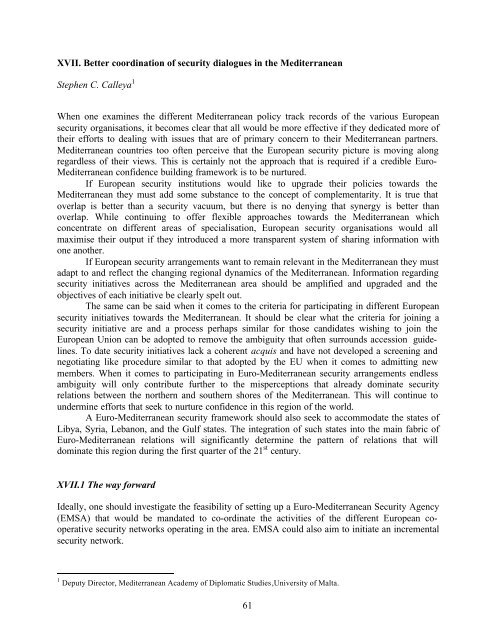The future of the Euro-Mediterannean security dialogue
The future of the Euro-Mediterannean security dialogue
The future of the Euro-Mediterannean security dialogue
You also want an ePaper? Increase the reach of your titles
YUMPU automatically turns print PDFs into web optimized ePapers that Google loves.
XVII. Better coordination <strong>of</strong> <strong>security</strong> <strong>dialogue</strong>s in <strong>the</strong> Mediterranean<br />
Stephen C. Calleya 1<br />
When one examines <strong>the</strong> different Mediterranean policy track records <strong>of</strong> <strong>the</strong> various <strong>Euro</strong>pean<br />
<strong>security</strong> organisations, it becomes clear that all would be more effective if <strong>the</strong>y dedicated more <strong>of</strong><br />
<strong>the</strong>ir efforts to dealing with issues that are <strong>of</strong> primary concern to <strong>the</strong>ir Mediterranean partners.<br />
Mediterranean countries too <strong>of</strong>ten perceive that <strong>the</strong> <strong>Euro</strong>pean <strong>security</strong> picture is moving along<br />
regardless <strong>of</strong> <strong>the</strong>ir views. This is certainly not <strong>the</strong> approach that is required if a credible <strong>Euro</strong>-<br />
Mediterranean confidence building framework is to be nurtured.<br />
If <strong>Euro</strong>pean <strong>security</strong> institutions would like to upgrade <strong>the</strong>ir policies towards <strong>the</strong><br />
Mediterranean <strong>the</strong>y must add some substance to <strong>the</strong> concept <strong>of</strong> complementarity. It is true that<br />
overlap is better than a <strong>security</strong> vacuum, but <strong>the</strong>re is no denying that synergy is better than<br />
overlap. While continuing to <strong>of</strong>fer flexible approaches towards <strong>the</strong> Mediterranean which<br />
concentrate on different areas <strong>of</strong> specialisation, <strong>Euro</strong>pean <strong>security</strong> organisations would all<br />
maximise <strong>the</strong>ir output if <strong>the</strong>y introduced a more transparent system <strong>of</strong> sharing information with<br />
one ano<strong>the</strong>r.<br />
If <strong>Euro</strong>pean <strong>security</strong> arrangements want to remain relevant in <strong>the</strong> Mediterranean <strong>the</strong>y must<br />
adapt to and reflect <strong>the</strong> changing regional dynamics <strong>of</strong> <strong>the</strong> Mediterranean. Information regarding<br />
<strong>security</strong> initiatives across <strong>the</strong> Mediterranean area should be amplified and upgraded and <strong>the</strong><br />
objectives <strong>of</strong> each initiative be clearly spelt out.<br />
<strong>The</strong> same can be said when it comes to <strong>the</strong> criteria for participating in different <strong>Euro</strong>pean<br />
<strong>security</strong> initiatives towards <strong>the</strong> Mediterranean. It should be clear what <strong>the</strong> criteria for joining a<br />
<strong>security</strong> initiative are and a process perhaps similar for those candidates wishing to join <strong>the</strong><br />
<strong>Euro</strong>pean Union can be adopted to remove <strong>the</strong> ambiguity that <strong>of</strong>ten surrounds accession guidelines.<br />
To date <strong>security</strong> initiatives lack a coherent acquis and have not developed a screening and<br />
negotiating like procedure similar to that adopted by <strong>the</strong> EU when it comes to admitting new<br />
members. When it comes to participating in <strong>Euro</strong>-Mediterranean <strong>security</strong> arrangements endless<br />
ambiguity will only contribute fur<strong>the</strong>r to <strong>the</strong> misperceptions that already dominate <strong>security</strong><br />
relations between <strong>the</strong> nor<strong>the</strong>rn and sou<strong>the</strong>rn shores <strong>of</strong> <strong>the</strong> Mediterranean. This will continue to<br />
undermine efforts that seek to nurture confidence in this region <strong>of</strong> <strong>the</strong> world.<br />
A <strong>Euro</strong>-Mediterranean <strong>security</strong> framework should also seek to accommodate <strong>the</strong> states <strong>of</strong><br />
Libya, Syria, Lebanon, and <strong>the</strong> Gulf states. <strong>The</strong> integration <strong>of</strong> such states into <strong>the</strong> main fabric <strong>of</strong><br />
<strong>Euro</strong>-Mediterranean relations will significantly determine <strong>the</strong> pattern <strong>of</strong> relations that will<br />
dominate this region during <strong>the</strong> first quarter <strong>of</strong> <strong>the</strong> 21 st century.<br />
XVII.1 <strong>The</strong> way forward<br />
Ideally, one should investigate <strong>the</strong> feasibility <strong>of</strong> setting up a <strong>Euro</strong>-Mediterranean Security Agency<br />
(EMSA) that would be mandated to co-ordinate <strong>the</strong> activities <strong>of</strong> <strong>the</strong> different <strong>Euro</strong>pean cooperative<br />
<strong>security</strong> networks operating in <strong>the</strong> area. EMSA could also aim to initiate an incremental<br />
<strong>security</strong> network.<br />
1 Deputy Director, Mediterranean Academy <strong>of</strong> Diplomatic Studies,University <strong>of</strong> Malta.<br />
61
















